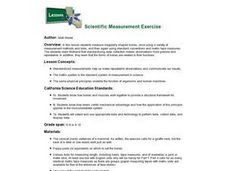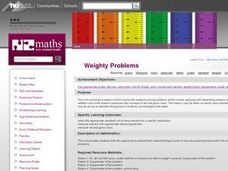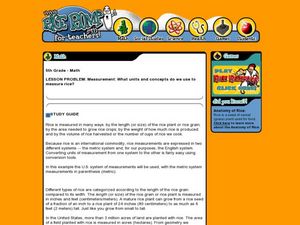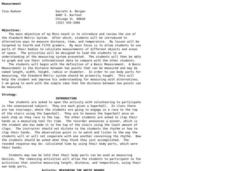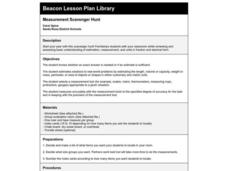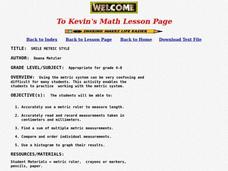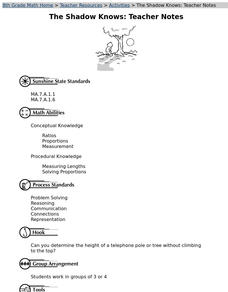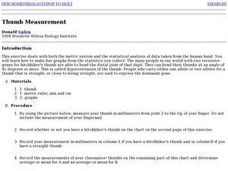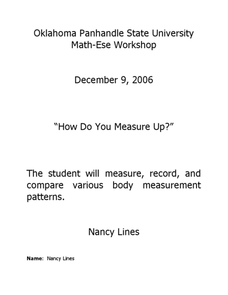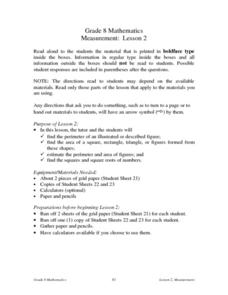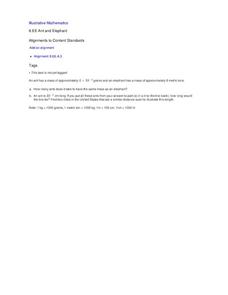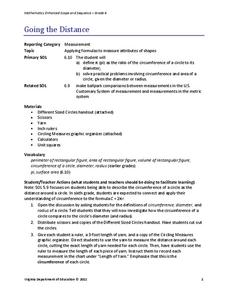Curated OER
Scientific Measurement Exercise
Young scholars measure irregularly shaped bones, once using a variety of measurement methods and tools, and then again using standard conventions and metric tape measures. They explore firsthand that standardizing data collection makes...
Curated OER
Mass: Applying and Interpreting
Students rotate through six studying stations solving problems that involve applying and interpreting aspects of mass. They solve various word problems, and measure the contents of cans and calculate the mass of two cans.
Curated OER
Graphing Toad/ Frog Respiration
Learners measure respiratory rates on live toads, and the effect water temperature has on their findings. In this scientific method lesson plan, students record their findings and present them in a graph, comparing the results.
Curated OER
What units and concepts do we use to measure rice?
Fifth graders look at different ways to measure rice. In this rice measurement lesson, 5th graders see the metric and customary measurements. They discuss how rice is measured by length, area of the field, weight, volume and yield.
Curated OER
The Metric System
Learners convert measurements within the metric system. In this measurement lesson, students explore the different units of the metric system and practice converting numbers from one unit to another.
Curated OER
Measurement
Students study the metric system and examine other ways to measure. In this measurement lesson students complete activities that help them to better understand the measuring system.
Curated OER
Learning to Measure
Fourth graders explore measuring with English unit rulers. They practice measuring in fractions of inches. Students discuss how to place the ruler when measuring an object. They begin measuring using rulers with 1/4 inch increments and...
Virginia Department of Education
Linear Curve of Best Fit
Is foot length to forearm length a linear association? The class collects data of fellow scholars' foot length and the length of their forearms. They plot the data and find a line of best fit. Using that line, they make predictions of...
Curated OER
Dinosaur Tracks: From Stride To Leg Length To Speed
Students determine the relationship between leg length, stride length, and speed in humans and bipedal dinosaurs. They collect data and graph these human characteristics then use actual data collected from dinosaur track pads and fossils...
Curated OER
Measurement Scavenger Hunt
Students review estimation, measurement, fractions, decimals while familiarizing themselves with a new classroom at the beginning of the year.
Curated OER
Smile Metric Style
Learners practice working with the metric system. Students use a metric ruler to measure and record lengths of group member's smiles, and graph their results. Learners find the sum of all the smiles.
Curated OER
Smile Metric Style
Students take measurements using a metric ruler, find a sum of multiple metric measurements, and use a histogram to graph their results.
Curated OER
Tools of the Trade
Third graders explore and identify the tools that can be used to measure length, mass/weight, and volume. They discuss how things are measured using different units, and observe the difference between the English and the Metric systems....
Curated OER
The Shadow Knows - Measuring Other Students
Eighth graders measure height and shadow length of other students on a sunny day and develop a ratio. They apply the ratio to other students and objects using shadows to determine height.
Curated OER
Thumb Measurement
Pupils practice measuring using the metric system and millimeters. They measure their thumbs and record their findings. Students record the findings of their classmates and find the average or mean for the two groups.
Curated OER
How Do You Measure Up?
Students explore the concept of measurement, modelling the increments on a standard ruler using cubes and grid paper. They identify the length of a line to a designated standard unit and measure specified body parts.
Curated OER
Measurement: Lesson 2
Fourth graders find the perimeter of a geometric shape by adding the lengths of the sides. They find the area of a square or rectangle by counting square units. Students use multiplication to find the area of a rectangle. They estimate...
Curated OER
Ant and Elephant
Have you ever wondered how many ants make up an elephant? Inquisitive minds will be amazed as they use scientific notation to compute and compare the mass of an elephant to an ant. Have participants make guesses and see how close they...
Virginia Department of Education
Going the Distance
Estimate the value of one of the most famous irrational numbers. The hands-on lesson instructs classmates to measure the circumference and diameters of circles using yarn. The ratio of these quantities defines pi.
Curated OER
Introduction to Measurement
Student observes and measures the variability in the length of the forearm and the length of the foot and to test a common belief that the length of the foot is equal to the length of the forearm.
Curated OER
A Fashion Extravaganza
Learners decide what body measurements they need to make garments such as a pair of pants. They make a list, and work with a partner to take and record those measurements in centimeters. They discuss the use of centimeters.
Curated OER
How Long? How Wide?
Second graders distinguish between and use nonstandard and standard units of measurement, use appropriate tools and techniques to measure length and width, and record and interpret data using graphs.
